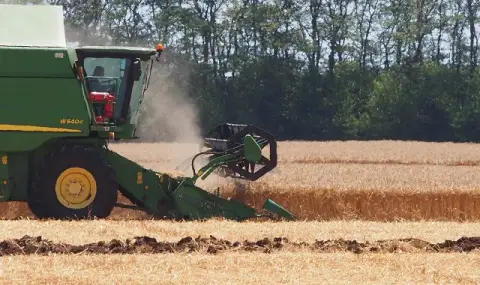The European Commission is moving to impose tariffs on grain and related imports from Russia and Belarus, seeking to prevent Moscow from using agricultural products as a tool to devastate the EU market. Moscow reacted immediately, the world agencies report.
"Tariffs are aimed at depriving Russia of revenue, as they will effectively suppress exports to the EU", the European Commission reports.
The new sanctions, welcomed by Kiev, will not apply to Russian grain passing through the European Union to other markets, so as not to disrupt food supplies elsewhere, European Trade Commissioner Valdis Dombrovskis explained.
Ukrainian President Volodymyr Zelensky complained at the meeting of EU leaders in Brussels via video link that it is not fair for Russian grain to continue to have "unlimited" access to European markets, while Ukrainian imports are limited. Imports of cereals, oilseeds and derived products from Russia and its ally Belarus are only around 1% of the total EU market, with local suppliers providing the bulk.
But with angry farmers already worried about an increase in cheap Ukrainian imports, the EU fears Russia will be encouraged to take advantage of the tense situation to further destabilize the 27-nation bloc, Daily Sabah reports.
"This supply shortfall will be filled in part by domestic EU production and will therefore benefit EU farmers who will be able to sell into the EU. In addition, the shortfall is expected to be partially filled by imports from third countries that traditionally supply the EU market, such as the USA, Brazil, Ukraine, Serbia or Argentina.", the EC says.
EU imports of cereals, oilseeds and derived products from Russia, including wheat, maize and sunflower meal, were 4.2 million metric tonnes in 2023 and valued at €1.3 billion. By comparison, EU suppliers provide 300 million metric tons per year.
Europe's idea is that tariffs should be high enough to discourage Russian imports.
"Our proposed tariffs will make the importation of these products commercially unprofitable. This will also help put an end to the Russian practice of illegally exporting stolen Ukrainian grain to the EU," Dombrovskis said.
"Consumers in Europe will definitely suffer", Kremlin spokesman Dmitry Peskov commented on the new measures.
According to the rules of the World Trade Organization, almost all Russian grain has so far been exempted from import duties in the EU. Under the European Commission's plan, which can be adopted quickly because only about two-thirds of member states need to agree, tariffs would reach €95 per metric ton or increase prices by at least 50%.
Against this background, Russia and Belarus will no longer have access to any of the EU grain quotas, which offer better tariff treatment for some products.
"We are proposing the imposition of tariffs on these Russian imports to mitigate the growing risk to our markets and our farmers," European Commission President Ursula von der Leyen said.
"They will reduce Russia's capacity to exploit the EU for the benefit of its military machine. And we stand by our commitment to preserving global food security, especially for developing countries."
In support of Ukraine in the war against Russia, the EU imposed several rounds of sanctions on Moscow. The measures target the energy sector, banks, the world's largest diamond mining company and other businesses. World food prices hit record highs as a result of Russia's invasion of Ukraine, combined with other factors, but have since fallen from record highs in 2022.
Although the EU did not ban Russian food or fertilizer exports to countries outside the EU as part of its sanctions packages, Moscow blames the bloc for global food shortages. EU representatives are adamant that tariffs on Russian grain will not affect trade with third countries and that transit through the European Union will remain unimpeded.
